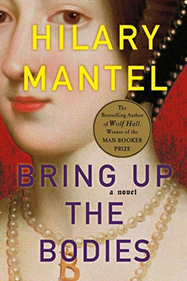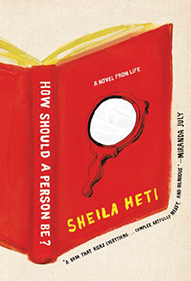by David Abrams
Buy on NOOK »-
March 22, 2013
Quarterfinals
-
Hilary Mantel
1Bring Up the Bodies
v.
3How Should a Person Be?Sheila Heti
-
Judged by
Saeed Jones
When a package appeared at my doorstep containing How Should a Person Be? by Sheila Heti and Bring Up the Bodies by Hilary Mantel, I worried in a quiet way that my decision had already been made for me. In both appearance and weight, the gravity of Mantel’s novel announces itself. It’s not a book; it’s a tome.
And then there’s the matter of that damn sticker. Shiny, gold stickers are bizarrely powerful things when placed on the cover of books. I know it. You know it. Oprah knows it. And now, I suppose, Mantel knows it too. As aloof as I try to be about the who’s who of the literati, even I know that Mantel was the first British writer to win the Man Booker Prize twice: once for Wolf Hall, which opens her Tudor-based trilogy, and then for Bring Up the Bodies.
Told from the perspective of Thomas Cromwell, the novel focuses on the royal intrigue that ultimately results in Anne Boleyn’s execution. Of course, Henry VIII and his ill-fated wives are not strangers to the literary spotlight. Mantel distinguishes herself by bestowing upon Cromwell an intellectual richness and humanity that challenges his typical portrayal as entirely demonic. Cromwell himself is haunted, even as he haunts and intimidates enemies in the court, chief among them Boleyn herself.
A shiny gold sticker, historical resonance, the promise of beheadings, my goodness. I self-consciously corrected my posture before I cracked open Mantel’s novel. It felt as though I was being tested. This wasn’t about reading a novel. It was about whether or not I would “get it.”
But oh, there sat How Should a Person Be? I was entirely unfamiliar with Heti’s work. (The same could be said for Mantel, of course. I knew nothing of her work, only her work’s reception.) In appearance at least, Heti’s novel seemed to be the whimsical younger sister to Mantel's tome. The cover of the book features the cover of another book, which in turn has a handheld mirror on its cover.
Part novel, part memoir, part philosophical quandary, this book follows a woman named Sheila Heti as she attempts to make sense of herself as a woman, friend, and artist. Dialogue from actual conversations between the real-life Heti and her real-life friends appears throughout the novel as conversations between the theoretically fictional Heti and her theoretically fictional friends.
I got to reading the novels concurrently, switching back and forth every few chapters. This might have been a mistake on my part. When left to my own devices, I tend to read two or three books at once, switching back and forth between books every few chapters. Connections that I otherwise wouldn’t have made come into stark focus as I engage different stories, and that’s how I approached these two contenders. It wasn’t long, however, before a kind of literary whiplash set in. One novel kept asking me questions and the other insisted that it already had all of the answers.
If I haven’t made it clear already, the only thing these novels have in common is that they were published in the same year by incredibly talented writers who happen to be women. The experience of reading them at the same time is something that my therapist and I will be discussing at length for the next few weeks. In the meantime, there’s the matter of making a decision.
Mantel is an elegant and calculating writer. From the novel’s opening sentence—“His children are falling from the sky”—to a comedic scene in which Henry VIII falls asleep in the middle of a banquet to Cromwell’s confrontations with both the freshly dead and soon-to-be dead, Bring Up the Bodies reads like a gorgeous trap. It’s an interesting feat. We know, mostly, who and how this tale will end. As we hover just behind Cromwell’s shoulder, we watch him allow his prey to believe they are in fact the predators.
In contrast to Mantel’s brooding and complicated plot, Sheila Heti’s protagonist muses and moans her way through the pages. There isn’t exactly a plot, so much as a movement through time, cities, and conversations. I’m not complaining. Heti’s experimentation with form as well as the deceptively comic nature of her writing thrilled me.
My initial fear that the gravity of Mantel’s novel would overshadow not only its competitor, but me as well, slowly dissipated as I read both books. Though I initially underestimated Heti’s comic novel, I felt as though I had crossed a threshold when one of her characters remarked, “You have to know where the funny is, and if you know where the funny is, you know everything.”
If I had to pick a turning point in my experience reading these two books, that was it. This wasn’t just a funny, clever novel; it was a novel featuring women I felt as though I knew and questions I certainly have asked myself.
More than just “a novel from life,” Heti’s novel is a product of the kind of questions we ask ourselves in the company of our loneliness. She wants to get life right, but can’t seem to figure out how to ponder life while also living. She wants to have a genuine friendship with Margaux but can’t resist overthinking her friendship. She loves the messy, embarrassingly passionate sex she has with Israel, but not nearly as much as she loves thinking about the messy, embarrassingly passionate sex itself.
It wasn’t long before the distance between myself and Mantel’s characters began to seem an impassable expanse. Bring Up the Bodies is a force to be reckoned with, to be sure. But you can’t have a conversation with a force. You witness it, survive it, grapple with the awe of it.
Impressive as Mantel’s undertaking may be, I found it difficult to be moved by a plot that was ultimately a foregone conclusion. And, if we’re being frank, I’m not sure what I have to gain from yet another novel in which women are royal chess pieces. I was hoping to read a novel that I could engage with, mull over, and look in the eyes. How Should a Person Be?, it turns out, has beautiful eyes.
Match Commentary
By Kevin Guilfoile & John Warner
John: This has to be the biggest upset in the nine years of the Tournament. We’re talking NC State over Phi Slama Jama Houston, or Buster Douglas taking down Mike Tyson, or AfterMASH getting a second season.
There have been some Cinderellas in past Tournaments. The Particular Sadness of Lemon Cake was roundly disliked by our readers, but managed to get to the Zombie Round without a loss before being sent home by A Visit From the Goon Squad. City of Refuge made an improbable run to the championship in 2009 before going down to Toni Morrison.
In each previous case, the Cinderella couldn’t get past the juggernaut, until now. Booker Prize winner, the sequel to a Rooster winner, out of the Tournament. Maybe there’s some good news for Hilary Mantel in the Zombie voting, but I have my doubts.
Kevin: This one really is a shocker to me, not just because I preferred Mantel’s book, but because the historical metrics of the Rooster would predict an easy victory for a heralded historical doorstop over a (physically) thin, modern experiment. But I thought Judge Jones described his reasons for preferring the Heti plainly. It moved him more.
John: Saeed Jones articulates one of the issues I often have with historical fiction, which is, full confession, one of my least favorite genres: the “foregone conclusion” nature of the plot. I realize that the pleasure in Mantel’s books is how she can bring her psychologically penetrating eye to bear on such well-known “characters,” but these pleasures are somewhat illusory to me, and perhaps to Judge Jones as well.
Judge Jones identifies with the characters in How Should a Person Be? to a degree I don’t share, but I understand where he’s coming from in his response. Heti’s work got under his skin in a way Bring Up the Bodies, almost by design, isn’t going to achieve.
As Jones says: “Heti’s novel is a product of the kind of questions we ask ourselves in the company of our loneliness.” Personally, I don’t truck in this kind of angst, though I’m not entirely uninterested in people who do. There are some haters of Heti’s work out there, and I’m wondering how much of it is rooted in a kind of judgment against the attitudes she displays in the novel.
The cliché is that the unexamined life isn’t worth living, but I think some people just don’t care for the manner in which Heti goes about examining her life. But Saeed Jones’s is the only opinion that matters here.
Kevin: I am already on record as saying I just didn’t get How Should a Person Be? It didn’t affect me or move me the way it did Judge Jones. But I do think Heti knows what she’s doing. I think she had a personal vision for what she was trying to say, and for the way she was trying to say it. I can admire that, and if that connects with the reader, something magical can happen. Certain books are like hypnotism. They make some people cluck like a chicken, and they leave others scratching their heads, wondering when the show’s going to start.
Which gives me a chance to talk for a moment about a book that missed both of us in the opening round. As we said, neither of us usually has time to read every book in the tourney, but between the two of us we try to cover them all. For whatever reason, neither one of us got to Miles Klee’s Ivyland before it lost to Gone Girl in the opening round, and we took some well-deserved grief for that. I’ve since had a chance to read it and I want to make a few comments about it.
I thought Ron Hogan did a nice job of categorizing the novel’s strengths and weaknesses. In its best parts (including a scene referenced by Judge Hogan, involving a stolen ice-cream truck) it reminded me a bit of A Clockwork Orange. As the story jumped forward and backward in time and place, from New Jersey to Florida to outer space, though, I found myself losing a wrestling match with the text. I felt unmoored much of the time. I had a hard time picturing the setting and the characters. There just weren’t enough signposts left for the reader to find his way. At least not for me, there weren’t.
At one point Klee formats a chapter as if it’s a scene in a play. Heti actually does this quite effectively in How Should a Person Be?, which is, of course, about a playwright. In Ivyland there doesn’t seem to be any reason for it, except for the author wanting to try it. And once he commits to it he doesn’t think it through all the way. For instance, the scene involves a back-alley operation and one of the stage directions says “Lev pours half a bottle of water over his lucky scalpel and slices the back of Tom’s neck open as DH watches with growing unease, knowing he’s already cut too deep.” Of course in a play you can’t put important information like this—that Lev has cut too deep—in a stage direction. The audience would have no way of knowing that was the motivation for DH’s uneasy expression. And this would be nitpicking on my part in a novel that really works. (“It’s not really a play, Kevin.” “But then why format it like a play in the first place?”) Still I think it’s symptomatic of a book written with a very specific and personal vision, but not quite enough forethought about the way it’s going to be perceived and understood by the reader.
I will certainly give Heti credit for that. I think she’s given a lot of thought to the structure of her story and how that will affect the reader’s understanding of it. With Judge Jones it obviously paid off.
Miles Klee clearly has lots of ideas and he will write more books. I will eagerly read the next one.
John: I think the point you raise here is an important one. I think all successful novels are personal to the author. To even get to a novel-length page count, it better be personal. But at some point, that personal work is going to go find its way into the world without any explanation from the author. The audience will make of it what they will. My students sometimes complain about how teachers are always finding things that they don’t think the author intended.
I tell them that this is the point, that the magic happens when text meets reader, not when writer creates text.
Kevin: So after this surprising result, How Should a Person Be? will take on Gone Girl (“It’s a search for a woman vs. a woman’s search for herself!”) in the semifinals. As a former champion and pre-Tournament favorite, I think the expectation would be that Bring Up the Bodies would have the reader support to bring it back in the Zombie Round, but a study of the results proves otherwise. Maybe voters felt like Mantel didn’t need any help, and so this decision takes her out of the Rooster running. As of today the Zombies remain The Fault in Our Stars and Arcadia.
Semifinals start on Monday when The Orphan Master’s Son takes on Building Stories with Davy Rothbart of Found Magazine wearing the powdered wig.
























